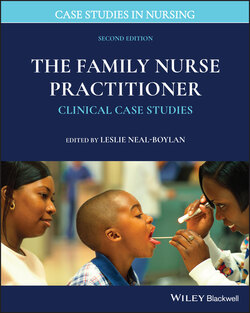Читать книгу The Family Nurse Practitioner - Группа авторов - Страница 27
ОглавлениеCase 3.2 Bedwetting
By Mikki Meadows‐Oliver, PhD, RN, FAAN
SUBJECTIVE
Four‐year‐old Javier presents to the office with his mother, Carol, with a complaint of bedwetting. Carol states that Javier consistently wets the bed each night although he remains dry throughout the day. According to his mother, Javier has never been dry at night but has been toilet‐trained during the daytime for 2 years. Carol is frustrated with this behavior because she is frequently washing bedsheets and having to buy new mattresses. She has a 5‐year‐old daughter who achieved daytime and nighttime dryness by the age of 3 years old. Carol said that Javier’s father is also frustrated with the bedwetting and will sometime spank Javier when he wets the bed. Carol says that her 5‐year‐old daughter teases Javier and calls him names such as “pee‐pee boy.” She says that she has already tried strategies such as limiting his liquid intake 2 hours before bed and waking him to urinate before she goes to bed. Carol states that often, when she goes to wake Javier before going to bed herself, he has already wet the bed. She does not know what to do now and has come to the office today because she would like assistance in resolving this issue. Javier has no other symptoms of illness.
Diet: Javier’s nutrition history reveals that he has a balanced diet with enough dairy, protein, fruits, and vegetables. He does not appear to eat or drink large amounts.
Elimination: He is voiding well (normal amounts) with no complaints of dysuria. Javier does have occasional constipation that is relieved with an over‐the‐counter laxative.
Sleep: Javier sleeps 11 hours at night and has no trouble falling or staying asleep.
Past medical history: Born via cesarean section at 38 weeks’ gestation. This was a repeat C‐section for Carol. Since being discharged at 4 days of age, Javier has had no hospitalizations. Javier had 4 teeth removed at 2 years of age, under general anesthesia, due to early childhood caries. He had an emergency department (ED) visit at 3 years of age for a broken arm after he fell from the jungle gym at day care. Javier passed his developmental screening at his last well‐child visit. He currently attends preschool and is doing well. He has no chronic illnesses and is taking no medications.
Social history: Javier lives at home with both parents and a 5‐year‐old sibling. His mother works as a store clerk, and his father is a school custodian. The family has no pets. There are no smokers in the home.
Family medical history: Javier’s mother (26 years old) and father (26 years old) are healthy and have no history of chronic medical conditions. His mother has sickle cell trait. His maternal grandmother (48 years old) has a history of heart disease. His maternal grandfather (50 years old) has a history of liver disease. Javier’s paternal grandfather (51 years old) has a history of vertigo. His paternal grandmother (50 years old) has a history of high cholesterol.
Medications: Javier is currently taking no over‐the‐counter, prescription, or herbal medications. He has no known allergies to medication, food, or the environment. He is up to date for required immunizations.
OBJECTIVE
Javier’s vital signs are taken, and his weight in the office is 20 kg. His temperature is within the normal range at 36.7°C (temporal). When observing Javier’s general appearance, he is alert, pleasant, and interactive. He appears well hydrated and well nourished.
Skin: Javier’s skin is clear of lesions. There is no cyanosis of his skin, lips, or nails. There is no diaphoresis noted, and Javier has good skin turgor on examination.
HEENT: Javier’s head is normocephalic. His red reflexes are present bilaterally; and his pupils are equal, round, and reactive to light. There is no ocular discharge noted. Javier’s external ear reveals that the pinnae are normal and that there is no tenderness to touch on the external ear. On otoscopic examination, the tympanic membranes are gray bilaterally, in normal position with positive light reflexes. Bony landmarks are visible, and there is no fluid noted behind the tympanic membranes. Both nostrils are patent. There is no nasal discharge, and there is no nasal flaring. Javier’s mucous membranes are noted to be moist. He has 16 teeth present. There are no lesions present in the oral cavity.
Neck: Javier’s neck is supple and able to move in all directions without resistance. There is no cervical lymphadenopathy present.
Respiratory: Javier’s respiratory rate is 20 breaths per minute, and his lungs are clear to auscultation in all lobes. There is good air entry, and no retractions or grunting are noted on examination. No deformities of the thoracic cage are noted.
Cardiovascular: Javier’s heart rate is 96 beats per minute with a regular rhythm. There is no murmur noted upon auscultation.
Abdomen: Normoactive bowel sounds are present throughout, and Javier’s abdomen is soft and nontender. Javier has shotty nodes present in his inguinal area bilaterally. These nodes are mobile, nontender, and nonerythematous. There is no evidence of hepatosplenomegaly.
Genitourinary: Normal circumcised male genitalia without erythema or lesions. His testes are descended bilaterally.
Neuromusculoskeletal: Good tone and full range of motion in all extremities; extremities are warm and well perfused. Capillary refill is less than 2 seconds, and his spine is straight.
CRITICAL THINKING
1 What laboratory tests or diagnostic imaging studies should be ordered as part of a workup for bedwetting?
2 What is the most likely differential diagnosis and why?
3 What is the plan of treatment, referral, and follow‐up care?
4 Does this patient’s psychosocial history affect how you might treat this case?
5 What if the patient lived in a rural setting?
6 Are there any demographic characteristics that might affect this case?
